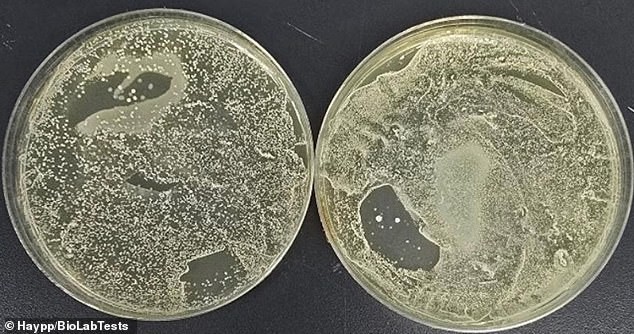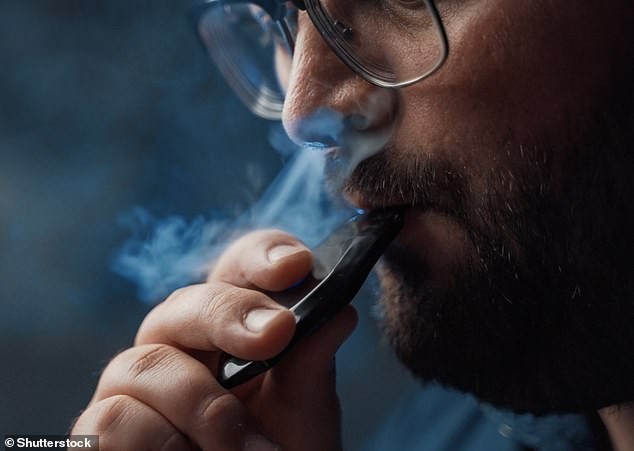Your vape is 3,000 times dirtier than a toilet seat, study reveals
You might think twice about putting a vape to your mouth thanks to a new study. Scientists have found that vapes, also known as e-cigarettes, are 3,000 times more infested with microscopic bugs than the average toilet seat. Lab experiments suggest the warm, moist environment of a vape mouthpiece can quickly become a breeding ground for bacteria and fungi if not cleaned regularly. Reynold Mpofu, a microbiologist at BioLabTests, an independent lab based in Coventry, said 'every touch and puff' of a vape adds up. 'This evidence highlights the critical importance of regular cleaning and exceptional hygiene for vape devices,' he said.

In This Article:
Study design and key findings
Vaping has emerged as a preferred alternative to traditional cigarette-smoking – with around 5.4 million people in the UK regularly using them. Evidence suggests vaping is less harmful than smoking, although some experts fear that health risks of vaping are not yet fully understood. Already, research has linked vaping with heart failure, lung disease and gum disease, according to the NHS and health experts. Experts at BioLabTests and online nicotine retailer Haypp have conducted a study revealing just how infested vapes can get if they’re not cleaned regularly (file photo). Lab experiments suggest the warm, moist environment of a vape mouthpiece can quickly become a breeding ground for bacteria and fungi if not cleaned regularly. Pictured, swab results of the vape mouthpiece after two weeks. Researchers at BioLabTests partnered with online nicotine retailer Haypp to conduct the new lab experiments. A strawberry ice flavoured Lost Mary vape was swabbed shortly after it was opened and again following 24 hours, 48 hours, 72 hours, one week and two weeks of use. The experts observed rapid microbial growth between two and three days of use, with colonies multiplying thousands of times over. By day three, there were around 150,000 individual colony-forming units (CFUs) of fungi and bacteria found swabbed the vape mouthpiece. This alarming figure is as many as 3,000 times more than the bacteria found on a typical public toilet (50 CFUs per square inch) and the maximum amount measurable by the lab. 'Laboratory analysis revealed that the mouthpiece is the dirtiest component of the vape,' said Mpofu. 'This isn’t surprising given that the human mouth, largely considered to be one of the dirtiest parts of the body, harbours approximately 700 species of bacteria.' While the mouthpiece had the highest levels of contamination, the body of the vape also harboured bacterial and fungal growth close to the lab's upper detection limit. The strawberry ice flavoured Lost Mary vape (pictured) was swabbed shortly after it was opened and continuously swabbed throughout a two-week usage period. The vape mouthpiece had the highest levels of contamination. Pictured, image of swab results for mould and yeast on the mouthpiece of the vape taken at two weeks.

Where germs come from and how they spread
Many of the microorganisms found on the vape are commonly found on human skin or in the surrounding environment, suggesting transfer from unwashed hands or surfaces. Examples include Bacillus, a bacteria commonly found in dirt, dust and the air, as well as Staphylococcus on human skin and E. coli, the common faecal bacterium found in public bathrooms that causes illness in humans. Researchers think there are even biofilms – slimy layers made from a community of microbes that are hard to remove – forming on our vapes. 'Much like phones, vapes are frequently handled and placed on a variety of surfaces, allowing germs, oils, and dirt from hands, pockets and various environments to latch on the device,' Mpofu said. 'The findings confirmed the presence of bacteria, including E. coli and Enterococcus, on the vape body, likely arising from inadequate hand hygiene or the transfer of microorganisms from bathroom environments or other contaminated surfaces. Paired with routine contact with faces, mouths, toilets, door handles, other people and even floors, this provides the perfect opportunity for microbes to transfer to the vape.'

Cleaning guidance and practical steps
The experts advise the public to give their vapes a wipe-down regularly with the same sort of products that we'd use to wipe our phone. Wiping vapes may even be more important as we put them to our mouths, unlike smartphones. 'We recommend wiping down both the mouthpiece and body every three days with a cloth dampened in antibacterial cleaner or using an alcohol wipe,' said Markus Lindblad, head of legal and external affairs at Haypp. 'Most advice online recommends once a week; however, our research shows this is far too long between cleans. For vapes with interchangeable pieces, these should be removed and cleaned individually to ensure no bacteria or residue is left behind.'

Vaping in the public health landscape and device types
In the UK, the number of vapers now outnumbers cigarette smokers – 5.4 million compared with 4.9 million, it was recently revealed. While e-cigarettes contain fewer toxic chemicals than traditional cigarettes, they usually contain nicotine, an addictive chemical. It's already known that nicotine constricts blood vessels and over time this leads to a loss of elasticity, which can increase the risk of developing heart disease. E-cigarettes are particularly risky for the developing brains of teenagers and can also damage babies in the womb, according to the World Health Organisation. An electronic cigarette (e-cigarette) is a device that allows users to inhale nicotine by heating a vapour from a solution that contain nicotine, propylene and flavourings. As there is no burning involved, there is no smoke like a traditional cigarette. But while they have been branded as carrying a lower risk than cigarettes, an increasing swell of studies is showing health dangers. E-cigarettes do not produce tar or carbon monoxide, but the vapor does contain some harmful chemicals. Nicotine is the highly addictive chemical which makes it difficult for smokers to quit. Nearly three million people in Britain use e-cigarettes, and more than nine million Americans. TYPES: 1. Standard e-cigarette Battery-powered device containing nicotine e-liquid. It vaporizes flavored nicotine liquid. 2. Juul Very similar to normal e-cigarettes but with sleeker design and, in the US, a higher concentration of nicotine. In the UK and EU limited to 20 mg/ml. Thanks to its 'nicotine salts', manufacturers claim one pod delivers the amount of nicotine as a pack of cigarettes. It is composed of an e-cigarette (battery and temperature control), and a pod of e-liquid which is inserted at the end. The liquid contains nicotine, chemicals and flavorings. Like other vaping devices, it vaporizes the e-liquid. 3. IQOS by Philip Morris Pen-shaped, charged like an iPod. Vaporizes tobacco. It is known as a 'heat not burn' smokeless device, heating tobacco but not burning it (at 350°C compared to 600°C as normal cigarettes do). The company claims this method lowers users' exposure to carcinogen from burning tobacco.


